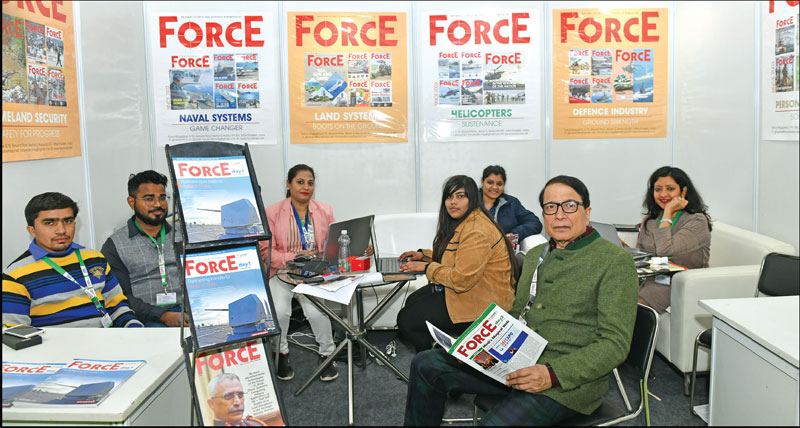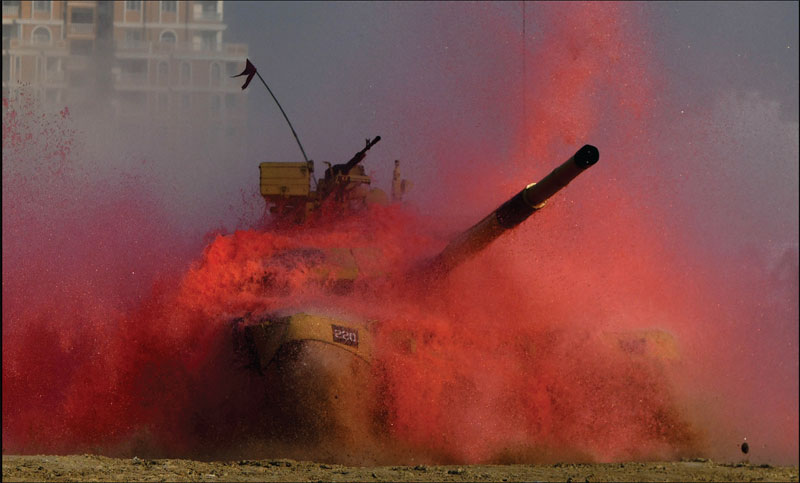With fingers in too many pies, DefExpo 2020 sends out confusing vibes
Ghazala Wahab | Lucknow
It has been a Force tradition to sum up the show in its last show daily, laying bare everything — the good, the bad and the ugly. Often the concluding article appears critical, but criticism should not be confused with mockery. The idea of highlighting the gaps has always been to help find ways of plugging them in the future. Given this, one feels a measure of satisfaction when regular exhibitors make a special pitstop at the FORCE stand to reminisce about some article that appeared several years ago in one of the show dailies. The article that is frequently recounted was the one on the state of the toilets at the show.

“I am sure somebody in the ministry of defence was reading your articles,” said one visitor yesterday. “I have noticed that the state of the toilets has progressively improved.” There is truth in the statement as far as the toilets at DefExpo 2020 are concerned. If there is one stand-out element about the show, it is certainly the toilets!
With this background, it is difficult to resist writing yet another piece summing up the show. So here goes. Every show has its own character and purpose. So has Indian defence shows, including DefExpo. It’s pointless to impose characteristics of other international shows on DefExpo. Especially DefExpo2020, which is so unique that it cannot even be compared with its previous editions. Unfortunately, uniqueness is not always the good thing. Sometimes straying too far from the script can yield confusing results.
And that has been the case at DefExpo 2020, a show so confused that it can no longer be called a land and naval systems show that also addresses technological concerns about homeland security. Fighter aircraft have been flying at the show to entertain the audience, while tanks have been kicking up coloured dust on the ground in a simulation of warfare. And nearly 15km away from the show venue, on the banks of river Gomti, Indian Navy and Indian Coast Guard have been performing tricks.
The question that arises is, what is the purpose of all this? What is being showcased and to whose benefit? If the idea of DefExpo is to showcase the capabilities of the Indian industry so that they are able to become part of the supply chain of global original equipment manufacturers or their offset disbursement partners, then how will the labour of the Indian military using imported wares help in this?
Live demonstration is a worldwide practice and routinely happens in most international air, land and naval shows. In these shows, equipment manufacturers are the stake-holders in demonstrations because they want to attract new customers. Often, the national military is co-opted in the demonstration for two reasons.
One, to underline the fact that the equipment has been successfully operationalised and is being operated by users (and not by the OEM under controlled circumstances);
And two, the armed forces, and because of them the ministry of defence, has been a stake-holder in the development of that particular system and consequently its export.
In both cases, the objective of the money and time spent, not to speak of the wear and tear of the equipment, is for purely commercial purposes. Only at air shows, a couple of days are earmarked for civilians to view the aerobatic display, which has been judged to have entertainment value.
However, at DefExpo 2020, the entire exercise of equipment demonstration has been done for the viewing pleasure of the visitors, without any commercial considerations. What can be the possible explanation for the aerobatics by Su-30MKI fighters.

Moreover, by creating a dedicated aerospace zone where indigenously developed Light Combat Aircraft (among others) has been displayed, DefExpo is no longer a land and naval systems show. It is a show for everything, including clothes, handicraft, home ware and food items, which incidentally are being showcased at the UP pavilion!
In the attempt to appear bigger than ever, the organisers have diffused the focus of the show. It wouldn’t be surprising if this has an impact upon Aero India, a show dedicated to defence aviation. Ideally, the MoD should have merged the civil aviation show with Aero India, creating an integrated aerospace show that could have become the ’go-to’ event in South Asia. Instead, it combined elements of defence aviation into the land and naval system show, taking the focus away from critical technologies which are germane to these domains. After all, who can compete with the aerial manoeuvres of a fighter plane at any show – the fighters bring both glamour and excitement.
The path of growth for DefExpo should have been greater integration of all land and naval technologies, including those which are of interest to the paramilitary and armed police forces. A niche show, irrespective of its size, always offer better opportunities and content to those interested in it. Unfortunately, DefExpo 2020 has little time for smaller niche technologies, for instance, urban surveillance or border management. Instead of creating a melange of this and that, wouldn’t it be better to create niche shows worthy of their names? In the same vein, wouldn’t it be better to once again give a permanent location to DefExpo, as it used to be once upon a time! Sometimes, familiarity is comforting.

